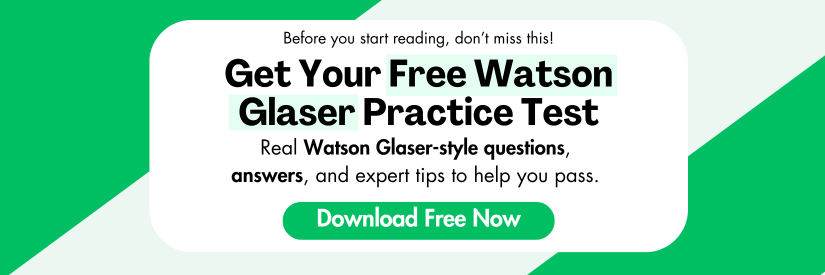
Practice the Watson Glaser Test for Free
Sep 17, 2024
Originally developed by Goodwin Watson and Edward Glaser, the Watson Glaser test is a critical thinking assessment.
Formatted as a timed, multiple-choice assessment, the Watson Glaser test aims to assess five key areas of critical thinking:
- Drawing inferences
- Recognising assumptions
- Deduction
- Interpreting
- Evaluating arguments
The Watson Glaser test is particularly popular with law firms and other similar industries, and is commonly used by businesses and organizations to assess the critical thinking skills of applicants.
This is done to ensure that the best possible candidates are shortlisted for an interview.
This article aims to provide advice and support for those taking the Watson Glaser test, with information about the assessment itself as well as useful practice tips.
Why You Need to Practice for the Watson Glaser Test
Companies that choose to use the Watson Glaser test as part of their recruitment process will often aim to employ the best of the best when it comes to candidates.
By asking candidates to complete a critical thinking test, employers can select individuals who have the skills and abilities they require.
This will include problem-solving skills, decision making, the ability to think objectively and impartially about a problem, and independent working skills.
If you’re asked to complete the Watson Glaser test, you will only have one opportunity to showcase your skills. This is why it’s important to be as prepared as possible ahead of your assessment.
Taking the time to work through Watson Glaser practice tests can help to finetune your critical thinking skills. You will be able to identify any weaknesses you may have and emphasize practice in these areas.
Watson Glaser Practice Test Questions
The Watson-Glaser Critical Thinking Appraisal (WGCTA) measures critical thinking skills and has five main sections:
- Inference
- Recognition of Assumptions
- Deduction
- Interpretation
- Evaluation of Arguments
Here are practice questions for each section of the Watson-Glaser Critical Thinking Appraisal (WGCTA), along with answers and explanations.
1. Inference
In this section, you'll be given a statement of facts followed by several inferences.
You'll need to determine whether the inference is:
- True: It definitely follows from the facts.
- Probably True: It is likely to follow from the facts.
- Insufficient Data: The information provided is not enough to decide.
- Probably False: It is unlikely but not impossible.
- False: It definitely does not follow.
Example 1:
Statement:
"In 2023, 80% of students in public universities reported satisfaction with their online learning experience."
Inference:
Most students in private universities were dissatisfied with their online learning experience.
The correct answer is: Insufficient Data
The statement provides information about students in public universities but says nothing about those in private universities. Therefore, we cannot infer whether private university students were satisfied or dissatisfied.
Example 2:
Statement:
"A recent survey found that 70% of residents in City A use public transportation regularly."
Inference:
More than half of the residents in City A use public transportation regularly.
The correct answer is: True
If 70% of residents use public transportation, it follows that more than half of them do, so this inference is true.
2. Recognition of Assumptions
In this section, you'll be presented with a statement, and your task is to decide whether an assumption is made in the argument.
You must determine whether the assumption is:
- Made or
- Not Made
Example 1:
Statement:
"Employees who work overtime on weekends should receive extra pay because they are sacrificing their personal time."
Assumption:
Employees value their personal time more than extra pay.
The correct answer is: Not Made
The statement argues that employees should receive extra pay because they are sacrificing personal time, but it does not assume that employees value personal time more than pay. The focus is only on compensating for time worked.
Example 2:
Statement:
"To increase efficiency, the company should upgrade its technology."
Assumption:
New technology will improve the company's efficiency.
The correct answer is: Made
The statement assumes that new technology will result in greater efficiency, which is not explicitly stated but implied by the recommendation to upgrade.
3. Deduction
In this section, you will be presented with a set of facts followed by a conclusion. You must decide whether the conclusion necessarily follows from the information provided.
Your options will be:
- Conclusion follows
- Conclusion does not follow
Example 1:
Premises:
"All managers in the company have access to the financial reports. Sara is a manager."
Conclusion:
Sara has access to the financial reports.
The correct answer is: Conclusion follows
If all managers have access to the financial reports and Sara is a manager, it logically follows that Sara has access.
Example 2:
Premises:
"All cats are mammals. Some mammals are carnivores."
Conclusion:
Some cats are carnivores.
The correct answer is: Conclusion does not follow
The premises do not explicitly state that cats are among the carnivorous mammals. Therefore, the conclusion cannot be confirmed based on the given information.
4. Interpretation
In this section, you are presented with a short argument followed by a proposed interpretation of that argument.
You must decide whether the proposed interpretation logically follows from the information given.
Example 1:
Statement:
"Most of the students who attended the lecture are biology majors."
Proposed Interpretation:
Some of the students who attended the lecture are not biology majors.
The correct answer is: Conclusion follows
If "most" of the students are biology majors, then by definition, it means that some are not. The interpretation logically follows from the statement.
Example 2:
Statement:
"All of the books in the library are either fiction or non-fiction."
Proposed Interpretation:
There are no books in the library that are neither fiction nor non-fiction.
The correct answer is: Conclusion follows
Since the statement says all books are either fiction or non-fiction, it logically follows that there are no books outside of these two categories.
5. Evaluation of Arguments
In this section, you must assess whether an argument is strong or weak.
An argument is strong if it is both important and directly related to the question being discussed. An argument is weak if it is either irrelevant or of minor importance.
Example 1:
Statement:
"Should the government increase funding for public transportation?"
Argument:
"Yes, because public transportation reduces traffic congestion."
The correct answer is: Strong Argument
Reducing traffic congestion is a valid, relevant, and important reason to increase funding for public transportation.
Example 2:
Statement:
"Should the government ban the sale of sugary drinks in schools?"
Argument:
"No, because children like sugary drinks."
The correct answer is: Weak Argument
The fact that children like sugary drinks is not a relevant or important reason when discussing health-related policies. It doesn't address the potential negative impacts of sugary drinks on health, which would be more relevant to the decision.
How to Practice Effectively For the Watson Glaser
However you choose to practice for the Watson Glaser test, you must practice effectively. This can look different for each individual as we all have different methods of learning and retaining information.
However, there are some helpful tips that may benefit you ahead of taking your assessment.
Watson Glaser Practice Test Papers
Paid for or free Watson Glaser practice test with answers will familiarize you with the format of the test as well as the style of questioning.
Paid for or free Watson Glaser tests are one of the most effective ways of preparing ahead of your assessment and can help you to feel more confident about your ability to perform well.
Timed Tests
The Watson Glaser test has a strict time limit. Making sure you practice answering questions under timed circumstances can significantly improve your ability to complete the assessment.
Consider Your Strengths
Everyone has strengths and weaknesses. Take time to think about the areas of critical thinking you may already be good at.
If you find there are areas in which you are less confident, make sure to focus on practicing free Watson Glaser critical thinking practice test questions that aim to evaluate these.
Practice Specific Skills
The Watson Glaser test is split into five sections, with each part aiming to analyze a different type of critical thinking skill.
These are:
- Drawing inferences
- Recognising assumption
- Deduction
- Interpreting
- Evaluating arguments
Take time to focus on each of these areas individually as well as part of a complete test.
Practicing individual skills will help you to improve your ability to answer as well as your confidence.
Read the Answer Explanations
A free Watson Glaser practice test with answers will often provide you with answer explanations after you complete them.
Make sure you take time to read these, as they will help you to understand exactly what employers are looking for from candidates taking the test.
You will then be able to answer questions more effectively and improve your chances of showcasing the skills your potential employer wants.
Manage Your Anxiety
If tests make you feel stressed or anxious, make sure to practice techniques ahead of taking the Watson Glaser test that will help manage these feelings.
Mindfulness and breathing techniques can help to manage difficult emotions and enable you to focus on the task at hand.
You can also:
- Find strategies for improving performance in each test section
- Practice your time management (for example, focusing on high-point sections) when taking free Watson Glaser critical thinking practice tests.
- Practice with answers and explanations to enhance understanding
- Practice taking a free Watson Glaser test online in timed conditions to simulate the real exam
Frequently Asked Questions
What is the Watson Glaser Test used for?
The Watson Glaser test is used as part of the recruitment process for companies requiring staff with exceptional critical thinking skills – for example, law firms.
How can I practice for the Watson Glaser Test for free?
TestHQ offers comprehensive practice packages for the Watson Glaser test, with practice questions and entire tests. You will also find explanations and analysis to help you understand the answers employers are looking for.
How many questions are on the Watson Glaser Test, and how long does it take?
The Watson Glaser test is formatted as a multiple-choice assessment. There are 40 questions in total, split to assess five areas of critical thinking. Candidates have 30 minutes to complete the test.
Are the free Watson Glaser practice tests similar to the real Watson Glaser Test?
Yes. Many of the practice questions and Watson Glaser practice tests you will find online will be based on real Watson Glaser test papers.
TestHQ provides candidates with genuine questions alongside similar ones to help candidates familiarize themselves with the style of questioning.
Can practicing with a paid for or free Watson Glaser test online improve my score?
Yes. By familiarizing yourself with the format and scoring system of the Watson Glaser test, you will be able to identify your strengths and weaknesses.
This will mean that you have an opportunity to work on any areas that may need improving. Practicing free Watson Glaser critical thinking test questions under timed conditions also enables you to work on answering as many as possible within the time limit.
Final Thoughts
If you are applying for your dream job and have been asked to take the Watson Glaser test, it is vital that you prepare. The businesses requiring candidates to complete this assessment will have very high expectations and requirements of their employees.
Using free Watson Glaser critical thinking tests and resources could mean the difference between being shortlisted and rejected, so candidates should prepare as best they can.
Taking the time to make use of practice Watson Glaser tests and evaluating your strengths and weaknesses can mean that you’re able to perform to the very best of your ability on the day.




